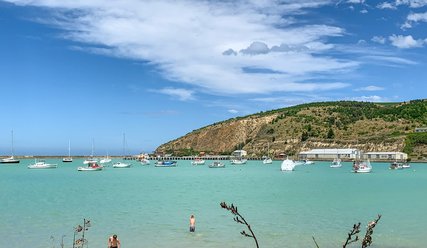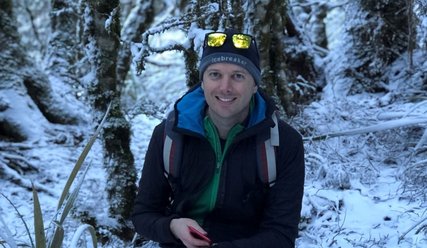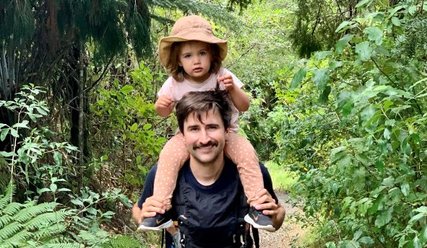Meet Matilda Hamilton: Rural Hospital Doctor, teacher and mum of two
When we caught up with Matilda one Friday afternoon, she’d just finished caring for an elderly patient at Dunstan Hospital in Clyde. Despite having a very busy last day as a rural hospital doctor at Dunstan, she graciously agreed to chat with us.
“I quite possibly have taken on too much,” she laughed, as she began walking us through the juggling act of being a rural hospital doctor, CME coordinator, teacher and a mum of two.
Matilda began her career in Dunedin, completing her undergraduate years at Otago University and moving on to placements in Rotorua, Whakatane, and Te Kaha, a small rural town on the East Cape. She’s on the brink of graduating from the Division of Rural Hospital Medicine (DRHM), and she already has the first year of the General Practice Education Programme under her belt. Next year, Matilda will be taking on her first consultant role at Taupo Hospital, and says she’s excited to be joining the team there.
She’s just taken on a teaching role for the University of Otago’s Rural Postgraduate Diploma alongside her colleagues Garry Nixon and Mark Smith, and says this new role helps her keep up to date with the latest research and clinical knowledge and allows her to share practical experience with students.
Developing new avenues for connectivity and education with CME webinars
On top of her teaching role, Matilda recently took over the reins from Dual Fellow Yan Wong as the university’s CME coordinator, and she’s looking forward to developing new avenues for connectivity and education between rural doctors across the country.
Her first initiative is to develop CME webinars that will help rural doctors overcome geographical barriers to accessing clinical updates. The first of these will be held via Zoom on 14 October this year, and will feature updates on atrial fibrillation and supraventricular tachycardia by the well-loved Dunedin cardiologist, Associate Professor Gerry Wilkins.
These webinars will be free of charge as a combined effort between the University of Otago and the Division of Rural Hospital Medicine. If you’d like to participate, click here to register. In the next few weeks further details about the webinar will be emailed to rural clinicians and advertised through e-Pulse, the College’s weekly e-newsletter.
Outside her busy professional life, you’ll find Matilda and her wife Kate, who are both keen mountain bikers and trampers, soaking up the “otherworldly” landscape of Central Otago.
What do you enjoy most about being a rural hospital doctor?
“I love the diversity of what we see,” Matilda says. “From acute resuscitation across all ages to in-patient care, rehabilitation and palliative care, we get to work across a huge range of areas. That can also be a challenge; you don’t have the luxury of getting really comfortable in a single area. You need to be able to jump into a lot of different things, and you need to be constantly reviewing the guidelines and seeking advice – you must be open to learning.”
“From acute resuscitation across all ages to in-patient care, rehabilitation and palliative care, we get to work across a huge range of areas. That can also be a challenge; you don’t have the luxury of getting really comfortable in a single area. You need to be able to jump into a lot of different things, and you need to be constantly reviewing the guidelines and seeking advice – you must be open to learning.””
One of the biggest highlights for Matilda is the continuity of care she is able to provide her patients.
“We see the patients from the day they arrive until the day they leave and get to build really good relationships with them along the way.”
For Matilda, the diversity offered by the DRHM programme and the people contact were real highlights.
“You get to nurture your skills so that you can do a wide range of jobs. You’re working in small, tightly knit communities, where you can really get to know those you work with – and those you care for – in a meaningful way.”
While Matilda really enjoyed the programme, she says being a rural hospital doctor is not without its challenges.
“I sometimes feel a bit overwhelmed by a sense of responsibility. You know, I’m aware of the struggles our rural areas are facing…hospitals reach saturation point very quickly, and that is a hard burden for one person to carry, when you can only do so much yourself.”
Despite this, Matilda says she’d encourage up-and-coming doctors to undertake the DRHM programme.
“If you enjoy diversity and connection with the community that you’re servicing I would definitely suggest doing rural medicine. There are so many options – you can really create your own pathway. The other great thing is that the teachers and senior doctors guiding you have a vested interest in helping you – so you’ll have a great experience and gain a lot from the programme.”
“If you enjoy diversity and connection with the community that you’re servicing I would definitely suggest doing rural medicine. There are so many options – you can really create your own pathway. The other great thing is that the teachers and senior doctors guiding you have a vested interest in helping you – so you’ll have a great experience and gain a lot from the programme.””


